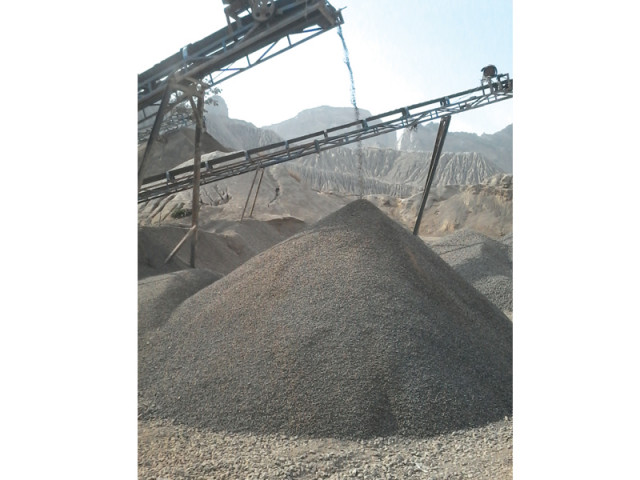Environmental hazard: Stone-crushing plants nibbling away Margallas
Activity also contributing to air pollution in federal capital.

Contrary to the claims made by environmental protection authorities, stone-crushing plants continue to operate near Taxila contributing not only to the air pollution in the surrounding areas including the federal capital but also badly affecting the habitat of Margalla Hills.
Over 700 plants are continuously nibbling away Margalla Hills National Park (MHNP) by quarrying, blasting and crushing stones into gravel.
Custodians of clean environment - the federal and provincial environmental protection agencies (EPAs) have so far failed to take any visible action against the stone-crushing plants.

Continuous quarrying in the once lush green Margalla Hills has badly affected plant and animal habitat in the area. PHOTOS: SHAHZAD ANWAR
So far apparently the EPAs have failed to inform the Supreme Court (SC) regarding the actual situation of the environment in the area.
On December 18, the apex court judges during the hearing on a petition expressed their dismay over the deteriorating situation of environmental pollution and sanitation problems in the federal capital.
The judges also sought reports from the federal and provincial governments regarding steps being taken to control pollution, in the hearing and ordered the Islamabad administration to launch a campaign for conservation and beautification of the hilly areas.
The representative of the EPA had submitted a report to the SC at that hearing and informed the court claiming that all the stone-crushing plants in Taxila had been closed and logging on Margalla Hills had also been stopped.
This reporter during a visit to the area on Sunday found that around 500 to 600 plants were working in the western part of Margalla Hills that falls in the limits of the Punjab government, while over 200 plants were operating inside the areas falling under the jurisdiction of the Islamabad Capital Territory (ICT).
“The crushing activity is destroying the natural habitat for the 38 species of mammals and over 600 plant species in the MHNP,” the Director General Environment Protection Agency, Dr Khurshid Khan said.
Clouds of dust can be seen hovering over the area where the plants are operating - a proof of lack of adoption of environment-friendly measures by the plants’ operators. The activity is contributing to the already grave situation of air pollution in the federal capital as well as the areas surrounding Taxila.

Continuous quarrying in the once lush green Margalla Hills has badly affected plant and animal habitat in the area. PHOTOS: SHAHZAD ANWAR
Due to floating dust particles visibility in the area is no more than a few hundred yards but the environmental watchdogs seemed to have closed their eyes to these clear signs of pollution.
Some environment officers claim the stone crushers have political backing and the federal and provincial EPAs lack the capacity to take stringent measures against these polluters.
The situation also sheds light on the lack of coordination between the two provincial government departments concerned, the PMMD and the Punjab EPA since majority of plants are operating in the limits of Punjab and the leases for stone-crushing in Margalla Hills are also issued by Punjab Mines and Minerals Department (PMMD).
The irony of the matter is such that when contacted most plants’ operators claimed that they did not even know that a ‘no objection certificate’ (NoC) was required before starting a crushing operation.
Some operators said that they could provide a quantity of gravel from 50,000cft to 100,000cft per day.
On the other hand, the crushers’ union claims that thousands of people will be laid off and construction material will become scarce if the operations are shutdown.
EPA Director Dr Ziauddin Khattak said that by using of wet scrubbers and sprinklers to suppress dust from crushers but some of these solutions require ample water and the cost might run around Rs200,000 per system.
Government subsidies on remedial measures might help, but in most policies, the stakeholders were not taken onboard before the laws were passed.
Published in The Express Tribune, December 29th, 2014.



















COMMENTS
Comments are moderated and generally will be posted if they are on-topic and not abusive.
For more information, please see our Comments FAQ